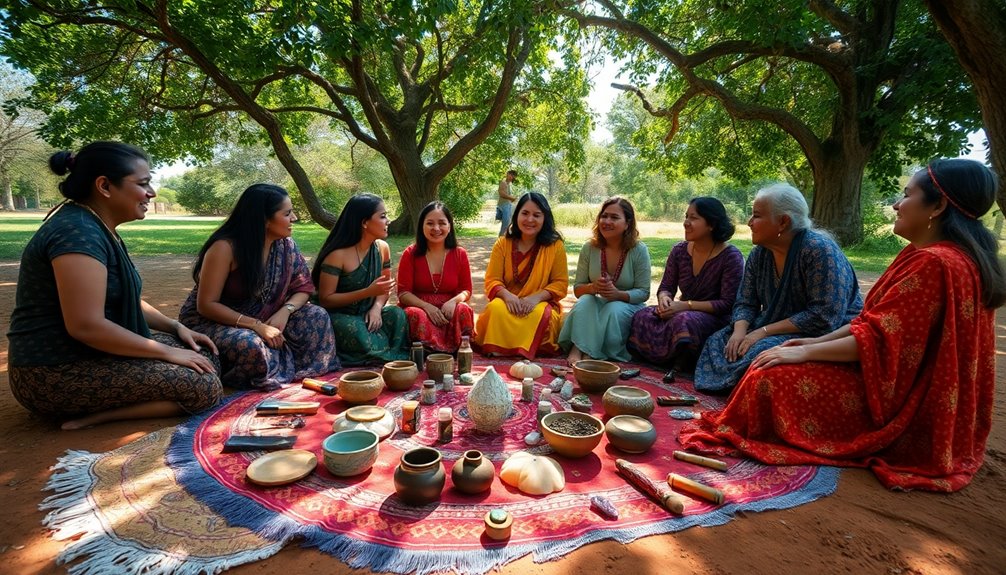Holistic health care is an integrated approach that emphasizes the interconnectedness of your physical, mental, emotional, and spiritual well-being. It focuses on treating you as a whole person rather than just addressing your symptoms. This approach combines traditional and alternative therapies, encouraging your active participation in the healing process. It also fosters the relationships and support essential for overall well-being. Curious about the various types of treatments and career paths in holistic health? There's more to explore.
Key Takeaways
- Holistic healthcare focuses on the interconnectedness of physical, mental, emotional, and spiritual well-being, treating the whole person rather than just symptoms.
- It integrates alternative medicine and natural therapies, promoting balance and personalized care tailored to individual needs.
- This approach encourages patient-centered care, with active participation in healing and fostering relationships for emotional support.
- Holistic health draws from cultural traditions like Chinese medicine and Ayurveda, addressing root causes rather than just symptom relief.
- Diverse modalities, such as acupuncture, massage therapy, and energy therapies, are used to promote relaxation and overall health improvement.
Definition of Holistic Healthcare

Holistic healthcare is all about understanding that your physical, mental, emotional, and spiritual well-being are interconnected. This approach emphasizes treating the whole person, rather than just addressing symptoms.
In holistic healthcare, health and wellness stem from the belief that individuals are more than the sum of their parts. By integrating alternative medicine and natural therapies, you can explore various methods for achieving balance.
Patient-centered care is at the heart of this philosophy, empowering you to actively participate in your healing journey. Recognizing the importance of interconnectedness, holistic healthcare fosters relationships and emotional support, which are essential for your overall well-being.
Embrace this all-encompassing approach to nurture all aspects of your health.
Integrated Approaches to Health

Understanding your health requires a multifaceted approach that goes beyond just treating symptoms.
Integrated approaches in holistic health care recognize that you're more than just your physical symptoms; they involve collaborative efforts among diverse care providers.
- You'll explore alternative therapies alongside traditional methods.
- Lifestyle changes are tailored to fit your unique needs.
- Personalized wellness recommendations empower you to take charge of your health.
- This method often incorporates law of attraction principles that emphasize the power of positive thinking in achieving wellness.
Cultural Roots in Holistic Health

Cultural traditions play a vital role in shaping holistic health care, as they emphasize the interconnectedness of physical, mental, and spiritual well-being.
Holistic health draws from various cultural roots, including Chinese medicine and Ayurveda, which offer unique therapies that enhance overall health.
By integrating these traditions, holistic practitioners create personalized approaches that address root causes rather than just symptoms, diverging from the conventional U.S. medical model.
This inclusive method not only improves pain management and symptom relief but also fosters cultural and spiritual renewal within communities.
As you explore holistic health, understanding these cultural foundations can lead to more effective and meaningful health care solutions tailored to your individual needs.
Career Opportunities in Holistic Health

As the demand for extensive health solutions grows, pursuing a career in holistic health can be both fulfilling and lucrative.
With accredited education and practical experiences, you'll find diverse career paths that allow you to make a real difference.
Consider these options:
- Naturopathic doctors focus on natural therapies, earning a median annual wage of $100,300.
- Nutritionists work on culturally specific dietary habits, with a median wage of $61,650.
- Holistic health practitioners often integrate therapies to address physical, mental, and emotional well-being.
The increasing interest in holistic health means more resources and training opportunities for aspiring health workers.
If you're passionate about holistic health, now's the perfect time to explore these rewarding career options!
Types of Holistic Treatments and Practitioners

Holistic treatments offer a diverse range of modalities designed to address the whole person, not just isolated symptoms. You might explore acupuncture or massage therapy, which promote physical well-being and relaxation.
Naturopathic physicians focus on natural therapies, creating personalized care plans to suit your unique needs. Energy therapies like reiki and Ayurveda work to balance your body's subtle energies, enhancing overall health.
Additionally, spiritual counseling can help you navigate emotional and spiritual challenges, supporting your journey toward holistic wellness. Integrative physicians blend traditional and alternative medicine, ensuring you receive thorough care. Incorporating natural anti-inflammatory remedies can also enhance your overall health by addressing inflammation-related issues.
Frequently Asked Questions
What Do You Mean by Holistic Care?
When you think about holistic care, it means looking at your entire well-being, not just isolated issues.
You're encouraged to explore your physical, mental, emotional, and even spiritual health.
It's about recognizing how these aspects connect and influence your overall wellness.
You're actively involved in your healing journey, often using diverse practices like meditation or herbal remedies.
This approach values your relationships and community support as essential parts of your recovery process.
What Is an Example of a Holistic Medicine?
Oh sure, because who wouldn't want to stick needles in themselves for fun?
Acupuncture's a prime example of holistic medicine. You insert thin needles into specific points to balance your energy, or chi, which sounds like magic, right? But really, it's about promoting wellness.
If you're looking for something a bit less pokey, you might consider Ayurveda or homeopathy.
Either way, these methods aim to treat you as a whole, not just your symptoms.
What Is an Example of Holistic Care?
An example of holistic care is when you visit a naturopathic physician who helps you manage chronic pain.
They combine lifestyle changes, nutritional advice, and herbal remedies tailored specifically for you.
You might also explore stress management techniques, like mindfulness or yoga, to support your emotional well-being.
This extensive approach not only addresses your physical symptoms but also recognizes the importance of your mental and emotional health in the healing process.
Does Holistic Mean No Medicine?
No, holistic doesn't mean no medicine.
It actually means integrating both conventional and alternative approaches to treat you as a whole person.
You might find that holistic practitioners often combine prescribed medications with natural therapies to address your health concerns.
The focus is on balancing your physical, mental, emotional, and spiritual well-being, so using medicine can be part of that journey towards ideal health.
It's all about finding what works best for you.
Conclusion
To sum up, holistic healthcare emphasizes treating the whole person—mind, body, and spirit. With over 70% of Americans seeking complementary therapies alongside conventional medicine, it's clear that this integrated approach resonates with many. By embracing various treatment methods and understanding cultural roots, you can enhance your well-being and career prospects in this growing field. Whether you're a practitioner or a patient, holistic health offers a thorough path to achieving a balanced and fulfilling life.









